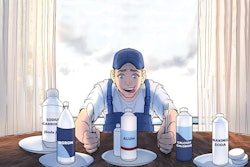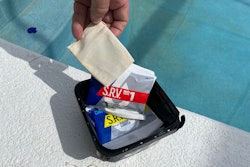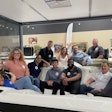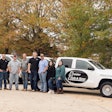The number of consumers spending time online to research and purchase retail items is growing every year. In fact, new households going online — and more online spending from those already there — will boost consumer spending on the Internet to approximately 13 percent of all general merchandise retail spending by 2010, according to research conducted by Forrester Research, an independent technology research company based in Cambridge, Mass.
Darien, Conn.-based Jupiter Research, which provides research to help companies profit from the Internet, says 43 percent of Internet users bought products from a retailer's brick-and-mortar store after viewing them on the seller's Web site. And the Dieringer Research Group, Milwaukee, says 114.1 million adults searched for product information on the Web in 2003, and that 98.9 million of them went on to make purchases either online or of.ine.
What do these statistics have to do with the aboveground pool market? We know this much: Consumers are using the Internet to research and purchase big-ticket items. How is this affecting traditional above-ground dealers. What can manufacturers do to help support their dealers. And how can dealers use their own resources to compete against Internet retailer?
An Informed Customer?
"There is definitely a major trend in Internet-only sales companies, which is increasing, because I see more and more companies getting involved with it," says Lloyd Breuer, director of sales and marketing for Wilkes Pool Corp. He defines these online businesses as companies that don't have offline retail stores and who can (and will) ship product anywhere in the country. "We started to see more Internet pricing and comparisons four or five years ago. It's very prevalent now."
Companies are selling aboveground pools on the Internet, Breuer says, and trying to lure consumers to purchase packages by offering lower costs than what a consumer might find in local retail stores. "The problem with pools is that it's very hard to compare one pool to another or one manufacturer to another or one package to another," he says. "So consumers are getting a feel for what they think a price should be, but there's always a lot of missing components to that price in the specialty and installation areas."
What dealers are finding, he says, is the Internet is educating consumers about available products and pricing, allowing them to enter a specialty pool store with an "I want this pool, I want this price" mindset. "In reality, [consumers] end up seeing that there are many more choices, more customization options available to them, and then after seeing salesmen at a reputable store, they get a better feel of what really works for them."
Risky Business
One consumer we talked to for this story recently purchased an 18-by-33foot oval above-ground swimming pool. Before making his purchase, he researched the swimming pool entirely online, spending as many as 50 hours on the Internet at manufacturer Web sites and online pool stores. He eventually bought his pool from an Internet retail store. The process of purchasing and receiving his pool went smoothly, but not all consumers are so lucky.
Not so long ago, one such consumer called Steve Shervin, national sales manager for the Delair Group, demanding $800 from the company because a box was missing when an Arizona-based online pool store shipped a Delair pool to his New York state residence. When the missing box didn't arrive on time, the customer had to pay a professional installer an additional $800 to return and finish the job. The "cheaper" online pool now cost the customer more than if he had purchased it from one of the five dealers within an hour of his home. "I told the customer they needed to contact the Internet company, but I think the company just told them that's a risk they have to take when ordering over the Internet," Shervin says.
Shipping complications aren't the only problem with buying online, manufacturers say.
"A lot of these pools require a bit more [construction] than it appears," says Breuer. "I've seen how some of these Internet sales companies are marketing the pool, but not a lot of detail of what's involved in putting the pool together and doing it successfully. That's a little bit of a worrisome trend, because if you don't put a pool up properly, you could have safety issues, and who's responsible for an installation that's not quite right and a pool collapses or you have a problem?"
In fact, Breuer says, an online dealer recently approached Wilkes Pool Corp. requesting to sell pools for them over the Internet direct to consumers. Wilkes declined because its was concerned about consumer safety and future lawsuits.
Another problem, says Jim Newman, executive vice president of operations for Splash SuperPools, Little Rock, Ark., is if someone purchases a pool over the Internet, who can they turn to when pool chemistry goes awry. "If you go to the Internet and buy a pool and you live in Arizona and you're buying a pool whose manufacturer doesn't have a dealer there locally, how do you get it serviced?"
Breuer concurs: "There is ongoing maintenance of the pool. Who do you call when you have a problem? Who do you go to to service that pool?" When homeowners have a problem, Breuer says, most Internet companies refer them to the Yellow Pages to find a local pool retailer. "There doesn't seem to be much in the way of support after the sale, and that's also to me a very dangerous trend."
Support System
To buck this trend, marketing professionals say, manufacturers should help support their above-ground pool dealers through their own Web sites and marketing materials to drive consumers to brick-and-mortar retail stores.
"Manufacturers need to create a Web presence that instills confidence in consumers to promote the sale and then directs them quickly to the nearest retailer," says Paul Entin, president of EPR, a marketing company based in Bloomsbury, N.J.
"We have an easy consumer inquiry form where if people have further interest in learning about our pools they will answer a short questionnaire and that will be sent to us via e-mail," says Breuer. "We turn around and take those leads and give them directly to the dealer in that specific person's area so that our dealer will have the ability of calling or e-mailing directly to the consumer."
Manufacturers also need to help create demand at the consumer level through advertising and public relations to drive offline store traffic, Entin says, and they should provide POP displays and other in-store marketing materials to help drive sales.
Keep in mind when promoting all products to remember synergy, adds Wally Bock, a retail consultant based in Greensboro, N.C. "The store should promote the site. The site should promote the store, and e-mail should promote both," he says. "Second, make sure your Net presence is tied to your overall strategy. Your site should look like your printed material and signage. You should have business objectives for your site and they should promote your overall strategy."
Share ResponsiblityA manufacturer's Internet and marketing support can help drive consumers to a retail store, but dealers should not rely entirely on their suppliers. They should also constantly promote their products and services through their own Web sites and marketing efforts.
Bock says when competing against Internet-only retailers, think of David and Goliath. "Use your Web site to show the pitfalls of buying without trained help, then show the advantages of dealing with you in your store," he says. "Tell about the things they can see at your location that they'll never find on the Web. Your salespeople are rocks in your sling. Your local presence is a rock in your sling."
Breuer says his dealers often link their own Web sites to Wilkes's Web site, but there are a variety of other inexpensive Internet options available to dealers.
Small companies can and should use Google's AdWords (adwords.google.com) as an inexpensive way to attract potential customers, says Richard Seltzer, an independent Internet writer and consultant. AdWords' ads connect retailers with new customers at "the precise moment when [customers] are looking for the [retailer's] products or services," Google's Web site says. With Google AdWords, retailers create their own ads, choose keywords to help Google match the ads to a specific audience and pay only when someone clicks on the ads.
Competing against Internet retailers is not very different from competing against the competition across town, says Entin. "Dealers need to stay in front of their customers consistently so that when a need arises, the customer remembers where to buy," he says. "Securing this share of mind is effectively done when using a combination of vehicles such as print catalogs, online keyword advertising, local media advertising, publicity, in-store displays and other materials."
The Bottom Line
In order to compete against Internet retailers, you have to push services, says Shervin. Include these services in your presentations to potential clients.
"The retail store has to be better prepared and they have to be cognizant of the fact that there are Internet companies they are competing against," Shervin says. Retailers have to be better prepared in their presentation to convince consumers that the services they offer that the Internet company can't offer are the reason some above-ground pools might be more expensive than pools found on the Internet, he adds.
"It's something that's there," Shervin says. "It's not going away, and because it's not going away you have to be better prepared to compete against them just like you have to be prepared to compete against your local competition. Tell a consumer why they should be buying from you over an Internet company."
The Best Of The Web
Above-ground pool retailers compete with a growing number of Internet-only dealers selling pools directly to consumers. Make sure your store's Web site is competitive by taking these five fundamental steps, suggested by The Webby Awards, to create an effective Web site.
1 Less Is More. Avoid extraneous bells and whistles that slow users down and prevent them from quickly and easily completing what they came to your site to do.
2 Stay Your Course. Keep your navigation bar consistent and prominent on every page so that your customers don't get lost. Implement guides to show users both where they are and how they can get back to where they started.
3 Make Contact. Put a clear link from the home page to your company's contact information. Include as many forms of contact as you can — telephone numbers and fax, postal mailing address and email. Customers will place more trust in your company if they know you are easily accessible.
4 Set Expectations. When it comes to online customer service, it's critical that you set your customers' expectations.
Acknowledge all contact with an automatic response e-mail so customers know you received their message. In the automatic response, let the customer know how long it will take for you to respond, and then respond in that time frame.
5 Keep Up Appearances. A good Web site is a work in progress. Keep your customers coming back by highlighting company or industry news on your home page. Every quarter — if not more often — review your site thoroughly to make sure everything is current and links are still alive.
The Webby Awards is an international award program established in 1996 that honors excellence in Web design, creativity, usability and functionality.







































